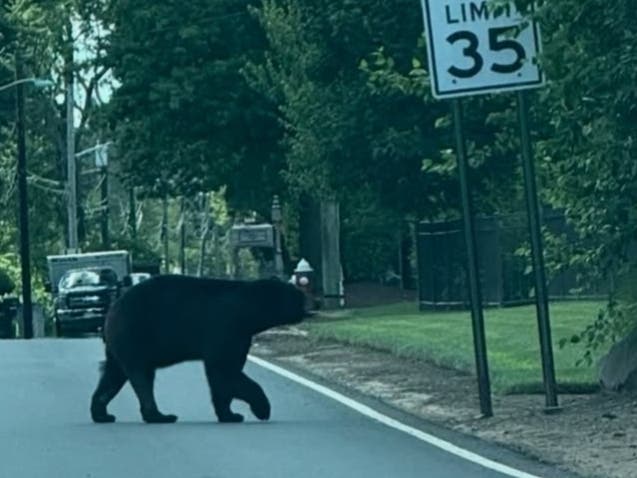FAIRFIELD, NJ — A bear was spotted wandering across a roadway in Essex County, but there is no known threat at this time, authorities announced Wednesday.
According to the Fairfield Police Department, the bear was seen in their township near the 30-block of Henning Drive.
“We are monitoring it at this time and awaiting further direction from the NJ Department of Fish and Game,” police reported on Wednesday afternoon.
“There is no known threat at this time, however, we urge all to not approach or leave pets outside at this time,” Fairfield police said.
Police offered the following safety tips for anyone who comes in contact with the bear:
- “Keep a safe distance: Maintain at least 100 yards (300 feet) from bears, and never approach them.”
- “Don’t run: Running can trigger a chase response.”
- “Stay calm: Speak to the bear in a firm, calm voice to make it aware of your presence.”
- “Make yourself look big: Raise your arms, wave your jacket, or make yourself appear larger.”
- “Back away slowly: Give the bear space to leave and avoid direct eye contact.”
According to the New Jersey Division of Fish and Wildlife, black bears are the largest land mammal in New Jersey. They are an integral part of the state’s natural heritage and a vital component of healthy ecosystems.
In recent years, black bear sightings have also been reported in Bloomfield, Irvington, Livingston, Maplewood, Millburn, Montclair, Roseland, South Orange and Verona, among other places in Essex County.
BEAR BEHAVIOR
The New Jersey Department of Environmental Protection says that mating season for black bears in the state runs between late May and August and peaks in June and July.
Black bears are not true hibernators and may be active all year long. However, during the winter, black bears enter a state of winter dormancy called torpor, experts say.
The NJDEP says that black bears are generally solitary animals, with the exception of sows with cubs. They tend to be crepuscular, meaning they are most active shortly before sunrise and again after sunset. However, they can be active during the day and may be active throughout the night. They will adjust their routines when it affords them the opportunity to take advantage of human-derived food sources – such as human garbage left out overnight, or food scraps at a campground.
The NJDEP continues:
“Black bears actively forage for food in the spring after they emerge from dens and in the fall when they are actively feeding to prepare for the winter den period. Black bears are also very active throughout the summer breeding season. These are the times of year when black bear/human encounters are most common, due to bears searching for food.”
“Black bears are typically not aggressive animals and tend to be wary of people,” the NJDEP says. “They do, however, engage in posturing to intimidate other animals and people when establishing dominance or when they feel threatened. And while extremely rare, predatory attacks do occur.”
LIVING ALONGSIDE BEARS: WHAT TO KNOW
Since the 1980s the Garden State’s black bear population has been increasing and expanding its range both southward and eastward from the forested areas of northwestern New Jersey. Within the most densely populated state in the nation, black bears are thriving and there are now confirmed bear sightings in all 21 of New Jersey’s counties, the NJDFW states on its website.
“The most common bear problem New Jersey’s residents experience is black bears getting into their garbage,” state officials say. “Bears are attracted to neighborhoods by garbage odors, so properly securing your garbage is one of the best ways to prevent bears from becoming a nuisance in your community.”
NJDEP wildlife experts emphasize that a black bear passing through an area and not causing a specific problem, such as breaking into trash or otherwise trying to access food sources on people’s properties or posing a safety threat, should be left alone.
“People should leave the area and allow the bear to continue on its way,” officials said. “When frightened, bears may seek refuge by climbing trees. If the bear does go up a tree, clear the area and give the bear time to climb down and escape.”
Residents can report bear damage, nuisance behavior or aggressive bears to the Wildlife Control Unit of the DEP’s Division of Fish and Wildlife at (908) 735-8793. During evenings and weekends, residents should call their local police department or the DEP Hotline at 1-877-WARN-DEP (1-877-927-6337).
According to the NJDEP, black bears have been sighted in all of New Jersey’s 21 counties, but the population is densest in the northwestern counties of Sussex, Warren, Passaic and Morris.
Send local news tips and correction requests to eric.kiefer@patch.com. Learn more about advertising on Patch here. Find out how to post announcements or events to your local Patch site.
